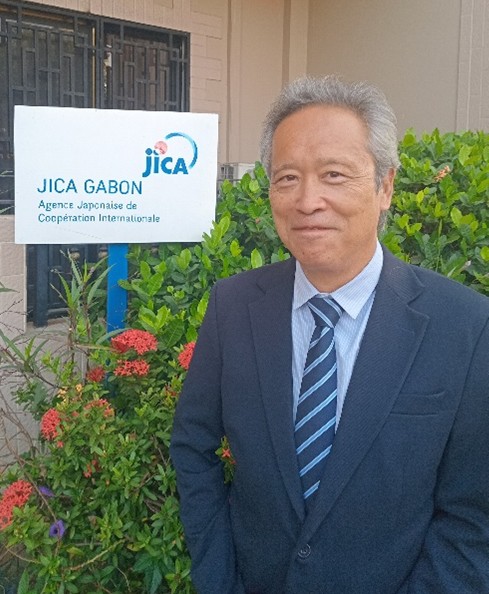The Gabonese Republic, situated on the Atlantic coast of Central Africa, covers an area of 267,667 km², more than two-thirds the size of Japan. It lies within the Congo Basin, home to the world's second-largest tropical rainforest, after the Amazon Basin. Approximately 88% of Gabon's land is covered by dense tropical rainforests, hosting rich biodiversity including chimpanzees, gorillas, and elephants. This biodiverse region is protected by a network of national parks and reserves. It is also the country where Dr. Albert Schweitzer, recipient of the Nobel Peace Prize in 1952, established his lifelong medical activities beginning in 1913, marking a significant chapter in the country's modern history.

Economically, Gabon is one of sub-Saharan Africa's leading oil producers, with a daily production of about 21,000 barrels per day as of 2023. The country is also rich in mineral resources, including manganese, and has substantial timber reserves. despite a modest population size of approximately 2.48 million (World Bank, 2023), Gabon achieves a Gross National Income (GNI) per capita of around 7,427 USD (2023) and the United Nations Human Development Index (UNDP) ranked Gabon 123th out of 183 countries in the world and 8th out of 54 African countries on the Human Development Index (HDI) in 2023, reflecting relatively high human development compared to many sub-Saharan African nations.
Urban areas in Gabon demonstrate significant economic development with many foreign workers from neighboring countries. In contrast, rural regions face challenges such as delays in infrastructural development and low agricultural productivity, which contribute to a wealth gap between urban and rural areas. To mitigate this disparity and reduce its dependence on oil, the Gabonese government launched the "Strategic Plan for Emerging Gabon" by 2025. This comprehensive strategy promotes infrastructure development, industrial diversification, development of processing industries ("Industrial Gabon"), environmental conservation ("Green Gabon"), and the growth of service sectors ("Service Gabon").
Historically, Gabon gained independence from France in 1960 with Léon M'ba as its first president. After his death in 1967, the former Vice-President, Omar BONGO ONDIMBA succeeded him and remained in power, he has been re-elected seven times until his death in 2009. His son, Ali BONGO, then assumed the presidency, extending the BONGO family’s governance to 56 years.
However, on August 30th, 2023, a coup led by Brice OLIGUI NGUEMA, head of the Republican guard, ousted Ali BONGO amid allegations of electoral fraud. Since then, a military regime under interim president Brice OLIGUI NGUEMA has ruled. In November 2024, a constitutional referendum passed reforms aimed at enhancing government transparency, including abolishing the prime minister role, instituting a vice presidency, limiting presidents to two terms, and banning familial succession. Subsequently, in April 2025, a presidential election was held for the transition to a democratic regime and Brice OLIGUI NGUEMA was democratically elected as president with 90% of the vote, and the presidential inauguration ceremony was peacefully held in May. Gabon has since been reinstated in the African Union (AU) after suspension following the coup, marking a hopeful new era.
Finally, I would like to mention about the JICA’s cooperation with Gabon that began in 2000 with fisheries experts, and in 2005 the JICA/JOCV office (Gabon office) opened in the Capital, Libreville, and the first six Volunteers were dispatched. Since then, projects have expanded smoothly, now over 30 Japan Overseas Cooperation Volunteers have been dispatched to support projects spanning infectious disease control, forest conservation, and ecotourism focused on gorilla observation.
In addition, every year Gabonese trainees take part in programs in Japan. Regarding grant aid, follow-up activities are conducted for the small-scale fishermen's center(CAPAL)through fisheries support.
However, the COVID-19 pandemic suspended projects in March 2020, but activities resumed by December that year thanks to the efforts of the Gabonese government. The first wave of COVID-19 was brought under control, and all related personnel resumed travel by December of the same year. As of July 2025, JICA maintains twelve (12) volunteers, two (2) experts in maternal and child health, and one (1) project coordinator for ecotourism programs. Additionally, JICA is involved in various areas, such as 5S Kaizen, the Coalition for African Rice Development (CARD), and the Smallholder Horticulture Empowerment and Promotion (SHEP), and foreign Investments expert is also dispatched.
JICA remains committed to supporting the efforts of the new Gabon and greatly values your continued collaboration and support.
July 2025
Toshimichi Aoki
Chief Representative, JICA Gabon Office




scroll